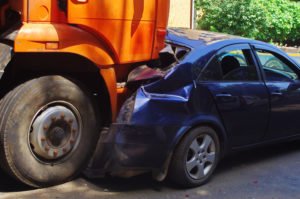
Nevada does not have a specific statute regarding trucking accidents. Instead, the general personal injury laws that govern automobile collisions extend to Nevada truck accident laws as well.
Since trucks are usually commercial vehicles, you may be able to sue the company that owns the truck – which will have deeper pockets than the truck driver who caused the crash.
Whom can I sue following a trucking accident?
Depending on the circumstances of the truck collision, you (the plaintiff) may be able to sue one or more of the following six parties (the defendants):
- The truck driver, typically a commercial driver with a CDL from their home state;
- The truck driver’s employer, which often owns the vehicle;
- The truck’s manufacturer, if the crash may have been caused by a manufacturing defect or defective design;
- The big rig and tractor/truck owners and the party renting it at the time of the accident (if applicable);
- The mechanics who serviced the truck if they caused the vehicle to malfunction; and/or
- The state or city government, if unmaintained roads caused the crash1
In cases where the truck was being driven by a commercial driver, the driver’s employer may be vicariously liable to you. In these cases, you would need to show that:
- The driver was employed by the defendant;
- The driver was acting in the scope of their employment at the time the accident occurred; and
- The truck driver’s actions proximately caused your injuries.2
If the trucker was on duty at the time of the crash, odds are the trucker’s employer would be liable for your injuries.
What are the different types of trucking accidents?
Eight common types of trucking accidents in Nevada include:
- Truck against sedan: These are often fatal for the sedan (or SUV) driver due to the sheer size difference between the vehicles, especially if the truck is an 18-wheeled rig. Many cases involve truckers failing to brake in time after miscalculating the distance between themselves and the vehicles around them.
- Truck against truck: These crashes sometimes happen when one of the truckers makes an emergency stop but fails to use proper protocols (such as cones or flares) to alert nearby truckers.
- Jackknife crashes: Jackknifing is when the front cab and the back trailer of a large tractor-trailer truck behave incongruously due to abrupt braking or a rear-end crash. The trailer then veers off to one side, potentially resulting in the truck sprawling across many lanes and creating a hazard for oncoming, high-speed traffic.
- Rear-end crashes: Simple physics dictates that when a truck does not brake in time and hits the vehicle in front of it, the vehicle will crumple and accelerate forward – often into more traffic. It is common to see drivers thrown through their windshields in these kinds of crashes.
- Overloaded truck crashes: Trucks have strict weight limits so as not to strain the tires, brakes, chassis, and engine. Overloaded trucks may cause the entire vehicle to malfunction, leading to often fatal collisions.
- Head-on collisions: These are often the worst trucking accidents, nearly always causing the involved cars or SUVs to careen into other lanes. In many cases, the trucker was suffering from fatigue and simply fell asleep at the wheel.
- Hazardous material accidents: Even if the truck crash itself is minor, any spillage of the hazardous materials (HMs) onboard can cause serious illnesses, burns, or other injuries to everyone in the vicinity. Hazmat teams may be required to clean up the mess, but the effects of the hazardous materials may linger for years.
- Run-away trucks: Even with the parking brakes on, heavy trucks can sometimes lose their brakes – particularly on inclined roads/ramps or roads slick with rainwater or snow. Sometimes trucking companies fail to inspect the brakes regularly, all but ensuring an eventual hydraulic- or air brake failure while on the road. A truck accelerating downhill can cause catastrophic damage to moving cars, parked cars, buildings, cyclists, and pedestrians.
Injuries in trucking accidents can be devastating. In addition to lacerations, broken bones, brain injuries, and/or spinal injuries, you may have burns from the gasoline tank igniting or any liquid hazardous materials the trucker may have been transporting.
Trucking accidents are often fatal when:
- there is a head-on collision,
- there is a rear-end collision, or
- the truck suddenly jack-knifes, which typically results in oncoming traffic colliding with the trailer.
It is not uncommon for truck accident victims to be decapitated.
What truck accident claims can I bring?
The most common grounds in Nevada trucking accident cases are:
Your attorney would conduct a “post-accident investigation” to determine what happened and which legal claims have the greatest chances of success.

Common carrier contracts include liability clauses that govern what happens in the event of an accident.


